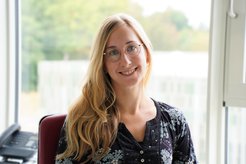Second research group begins its work at the Microcosm Earth Center
Dr. Julia Kurth launches her research group "Microbial Physiology" at the new center starting September 01, 2022.
One focus of Julia Kurth's research is the microbial formation of methane, the second most important greenhouse gas on earth. One of her goals is to find out what influence the formation of methane from wood has on the environment and climate change.

Just days before the official opening of their Research Center, the cooperation partners Max Planck Institute and Philipps University Marburg welcome their second research group leader at the Zukunftszentrum Mikrokosmos Erde/Microcosm Earth Center (MEC).
Julia Kurth’s work focuses on the metabolism of archaea, single-cell microorganisms that can thrive even in extreme environments such as hydrothermal vents or hot springs.
She is particularly interested in studying the formation of methane, the second most important greenhouse gas on earth. About 70% of the methane (CH4) produced worldwide can be traced back to the activity of methane-producing microorganisms called methanogenic archaea.
Previously, it was known that, methane can be mainly produced microbially in three ways: by using hydrogen and carbon dioxide, by the cleavage of small methane-containing compounds into methane and carbon dioxide, and thirdly from the breakdown of acetic acid. Julia Kurth and colleagues discovered how the archaeon Methermicoccus shengliensis, which lives at an optimum temperature of 65 °C, produces methane in a different way: by using so-called aromatic compounds. What makes this remarkable is that these compounds originate from the main constituent of wood, lignin, and thus occur in large quantities on earth. This methane formation from wood components by archaea could have a so far underestimated influence on the global methane and carbon cycles.
Julia Kurth explains: "Recently, more and more new archaea have been discovered through genetic analyses of environmental samples, but cultivable representatives or physiological studies are still missing. In general, for many archaea we do not yet know how exactly their metabolism works. Together with my future research group, I would like to expand our knowledge of these important microorganisms, understand their metabolism, and elucidate their global significance. One of my goals is to find out what impact methane formation from aromatic compounds has on the environment and climate change."
Victor Sourjik, director at the MPI and steering board member of the MCE, says: "Research on methane-forming microbes was already an important research focus of the Max Planck Institute when it was founded. Against this background, it is particularly gratifying to have another excellent scientist at the Future Center researching this topic at the highest level."
Julia Kurth received her doctorate in biology from the University of Bonn, where she conducted research on bacterial sulfur metabolism. She then worked as a post-doctoral researcher at the universities in Nijmegen and Wageningen in the Netherlands. For her work, she was awarded the prestigious Dutch KNVM VanLeeuwenhoek Prize in April 2022.
Prof. Gert Bange, Vice President of the University of Marburg, says: "I am very happy that with Ms. Kurth we have been able to recruit another excellent scientist who will reinforce our joint Future Center with her exciting research."
Two PhD positions are available immediately in Julia Kurth's research group and will be advertised shortly. Interested candidates are already invited to contact Julia Kurth.












